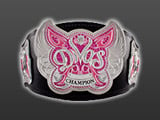 Divas from both Raw and SmackDown will compete in a battle royal to determine the #1 Contender for the Divas Championship next week on Raw.
Divas from both Raw and SmackDown will compete in a battle royal to determine the #1 Contender for the Divas Championship next week on Raw.
The winner will face Divas Champion, Kelly Kelly, at SummerSlam.
So, who’s your pick?
 Divas from both Raw and SmackDown will compete in a battle royal to determine the #1 Contender for the Divas Championship next week on Raw.
Divas from both Raw and SmackDown will compete in a battle royal to determine the #1 Contender for the Divas Championship next week on Raw.
The winner will face Divas Champion, Kelly Kelly, at SummerSlam.
So, who’s your pick?